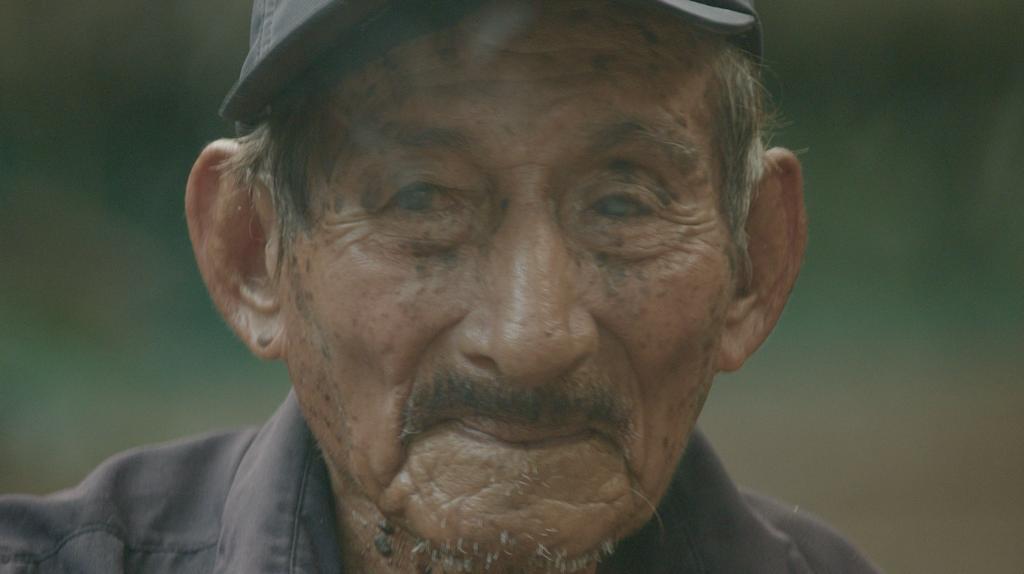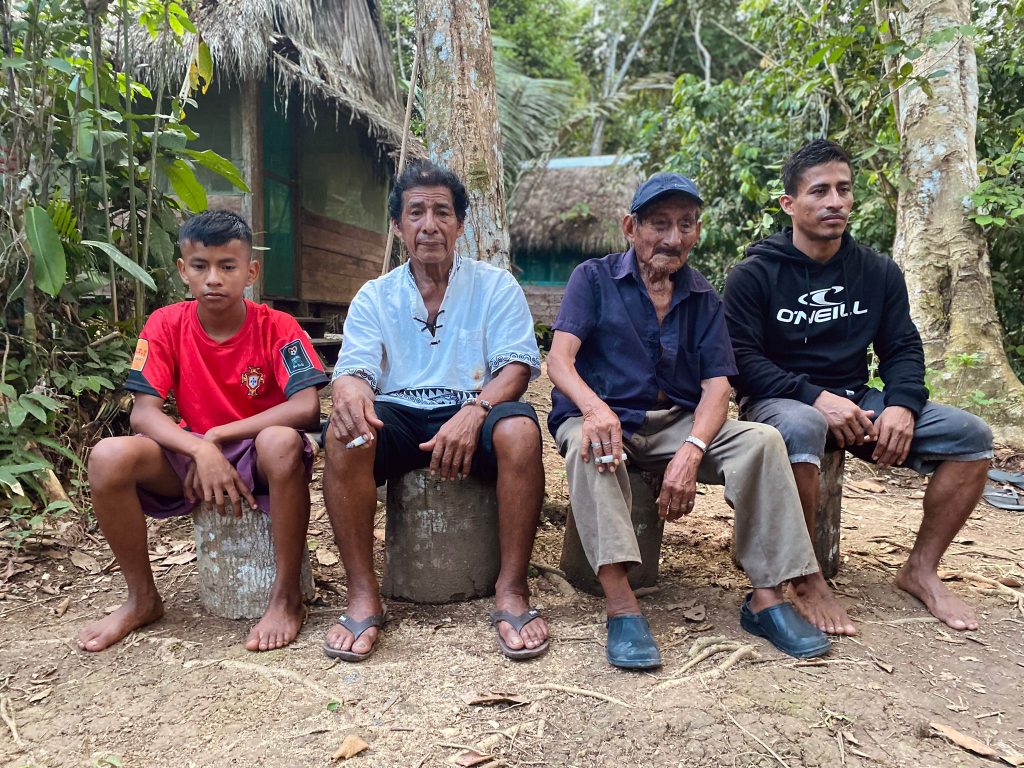Don Rómulo Magin has small, lively blue eyes, glassy due to advanced cataracts. At 94, Don Rómulo wakes up at dawn every day in his house/maloka in the Peruvian Amazon, takes up his machete, and opens paths in the jungle, or identifies medicinal plants he will use in his healing practices. His vision may be weak, but he still precisely recognizes hundreds, perhaps thousands of plants, which will be part of the diet for visitors and disciples at his center.
Don Rómulo was born in Ecuador and belongs to the Aguaruna people, related to the Shuar, and, as he says, direct descendants of an Inca lineage. His father and grandfather were healers. His mother tongue is Quechua, in which he speaks and ‘ikarea’. His Spanish is rudimentary, sprinkled with jungle idioms and Quechua terms, so his son Winister helps us with the translation into Spanish. Winister, like his son Winister Jr., was born in Peru, in the Loreto region, so their main language is Spanish. However, they continue to use Quechua in their ‘ikaros’: “The ‘ikaro’ must be done in Quechua,” explains Winister, “so that the medicine can do its work, Spanish is not suitable.”

Don Rómulo is depicted in the book ‘Singing to the Plants’, by Steve Beyer, on his ability to communicate with the spirit of birds:
«A sorcerer can send animals as spies, and especially can talk to birds in their own language; that is why a healer must know their language as well. Don Rómulo Magin, for example, is fluent in the language of búhos, owls, who are powerful sorcerer birds; their language, I am told, sounds like this: oootutututu kakakaka hahahahaha».
Winister, 59, and Junior, 33, are the two apprentices and successors of Don Rómulo, the penultimate vestige of a knowledge that would be lost if not for the surge in ayahuasca tourism. If ayahuasca – both the plant and the tradition – remains alive and strong in the 21st century, it is largely thanks to the thousands of ‘gringos’ (broadly understood, including myself) who land each year in Iquitos, Pucallpa, and Tarapoto in search of healing.
Yachay Wasi
However, the center run by the Magin family deep in the Amazon jungle is quite different from the shiny ayahuasca retreat centers around Iquitos, equipped with all sorts of comforts to make the gringos’ stay more bearable. Located three and a half hours from Iquitos, down the Amazon, Yachay Wasi (“House of Knowledge” in quechua) is a spartan center, like the homes of the river people: the ‘maloka’ is the living room of Don Rómulo’s house, and four ‘tambos’, austere but comfortable, accommodate visitors.
An Australian youth, Aaron, Don Rómulo’s advanced disciple, has just spent three months in one of these small houses dieting a master plant. Aaron, who received an “almost miraculous” healing from Don Rómulo, is simultaneously learning Spanish to communicate with the locals, and Quechua to understand the plants.

Four generations of healers: Don Rómulo, 94 years old, Winister, Junior, and young Orlando, 13 years old.
Aguaruna Medicine
Most travelers arriving in Iquitos are looking for a Shipibo master. The Shipibo-Konibo vegetalistas have maintained a very pure tradition, as well as aesthetically stunning, both in their ‘ikaros’ and in their geometric designs, the ‘kené’, a graphic expression of those.
If the Shipibo perform meticulous spiritual surgery in their ceremonies, Aguaruna medicine – or at least that offered by Don Rómulo and his family – works on deep cleansing, an indispensable requirement for healing: “Never in my 80 years as a healer has a patient died on me,” Don Rómulo proudly boasts. To Don Rómulo’s clinic come sick people – Peruvians and gringos – affected by serious diseases – sometimes even given up for dead – that white man’s medicine cannot cure.
The Magin’s “medicine” is not only ayahuasca but the ‘ikaros’, and above all, the diets followed by all members of this lineage of healers. Only Don Rómulo has completed five years of diets. “Without diet, there is no healing,” concludes Junior, proud inheritant of the ‘Hidden Science’.
More information about Yachay Wasi.
Don Rómulo and his family will be part of the documentary ‘Voces de la ayahuasca’, produced by Plantaforma para la Defensa de la Ayahuasca.
Links:-’Protective Spirits’, Singing to the Plants, February 8th 2008.